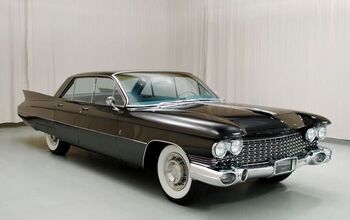Elderly Drivers: It Pays to Be a Playa
According to the Federal Highway Administration, drivers over 75 years old have the second-highest fatality rate after teens. CNN’s “When Dad Should Stop Driving” (what about mom?) warns that taking the keys away from an aging parent raises “tricky issues of independence and role reversal.” Marion Somers, author of Elder Care Made Easier (note: not “Easy”), provides a list of 10 question for sibs considering seizing the keys from Mom or Dad. Unfortunately, a lot of them apply to most drivers (e.g. "Does he or she do well driving locally but struggle at higher speeds or when directions are needed?"). She suggests a gradual curtailment for the old folks, rather than a single, indigestible dish of cold turkey (e.g. no children in the car, no highways, no driving above 45 mph). Somers knows of what she speaks. She says convincing her father to surrender the car keys was “one of the most serious and complicated issues that I've had to deal with." In the end, Dad’s “lady friend” was happy to pick him up for their dates. Which is nice, and all, but how old was she?
Glenn is a baby-boomer, born in 1954. Along with his wife, he makes his home in Connecticut. Employed in the public sector as an Information Tedchnology Specialist, Glenn has long been a car fan. Past rides have included heavy iron such as a 1967 GTO, to a V8 T-Bird. In between those high-horsepower cars, he's owned a pair of BMW 320i's. Now, with a daily commute of 40 miles, his concession to MPG dictates the ownership of a 2006 Honda Civic coupe which, while fun to drive, is a modest car for a pistonhead. As an avid reader, Glenn enjoys TTAC, along with many other auto-realated sites, and the occasional good book. As an avid electronic junkie, Glenn holds an Advanced Class amateur ("ham") radio license, and is into many things electronic. From a satellite radio and portable GPS unit in the cars, to a modest home theater system and radio-intercom in his home, if it's run by the movement of electrons, he's interested. :-)
More by Glenn Swanson


































Comments
Join the conversation
Agree with Logdog, above. I know a signficant number of people who are in their 80s--friends of my parents--who drive competently. People age at vastly different rates. I also think it would be good for society to figure out ways to make it easier for elderly drivers to keep driving. For example, perhaps when competence declines to a level where someone needs to drive more slowly than most people on the road, they could have a conspicuous "O" plate on the back of their car, so that other drivers wouild give them some slack. The driving issue--combined with the difficulty of getting around most places in the US on public transit--is the one thing that makes me think a self-driving car might be a good thing. And I hate the idea of self-driving cars.
Being a boomer myself and having had to take the keys from my mother, and soon my father and father-in-law, I am in favor of enforced physical, sight, hearing and mental testing, annually past the age of 65. This is one intervention of government I would go along with. It would have made my life much easier than being the bad guy key snatcher.
I wonder if the higher fatality rate among elderly driver is more a function of their driving poorly and getting into more accidents, or more a function of their being more frail and prone to injury when an accident occurs (but their tendency to actually get in crashes is unchanged). If it is the former, a more aggressive governmental approach to weeding out drivers whose skills decline with age is called for, because they are potentially a danger to others as well as themselves. If it is the latter, there is a stronger argument that the choice to drive (or ride as passenger) should be left to the individual -- the risk to his own life has increased, but he is not endangering others, so let him (and his family?) figure out what is best. Note that if the elderly are in fact more likely, as a group, to get into crashes, this does not mean that all old people are bad drivers, and become dangerous at the same rate. It is likely just be a question of weeding out a few drivers whose skills have declined while leaving the rest alone. Periodic sight, hearing and road skills tests (for all drivers, or all drivers above a certain age) would be a way to approach this problem. For pilots, even private pilots flying small planes, the FAA requires rather frequent medical exams in order to remain current, which are fairly strict. And while there has long been an age cap on airline pilot licensing, the safety justification that is usually proffered is largely regarded as a pretext, and it is understood that the real reason for the rule is to muster pilots out of the workforce at a predictable rate so that new pilots can find jobs (and to make sure that wage rates don't go too high with too much seniority). To return to the original question, I think that the following statistics could help sort out the real story behind elderly driver fatality rates: 1. Accidents per year per elderly driver, compared to drivers on average. 2. Accidents per 100,000 miles driven per elderly driver, compared to drivers on average. 3. Injuries and fatalities for passengers of elderly drivers, broken down by the age of the passenger. 4. Injuries and fatalities for those in cars involved in a crash with a car driven by an elderly driver. If elderly drivers tend to retain their skills but die more frequently because they are frail, then 1 and 2 should show no difference between elderly drivers and drivers at large. If elderly drivers lose some skill, but compensate for it by driving less, then 1 should show no difference while 2 should show a difference, but in such a case we should conclude the people are reasonable and, on their own, countering increased accident risk with increased precautions over time. Item 3 should reveal whether the accidents that elderly people get into are, in fact, unusually dangerous ones, or whether they are average or even less violent then normal (the increase in fatality thus due to frailty), and item 4 should inform our discussion regarding whether elderly drivers tend to pose a serious risk to others.
mandatory driver tests (real tests, not this turn on the car, make a left turn, do a k-turn, parallel park b.s. . . . . actually, some states don't even make you parallel park!) for the entire population in 3 year intervals problem solved